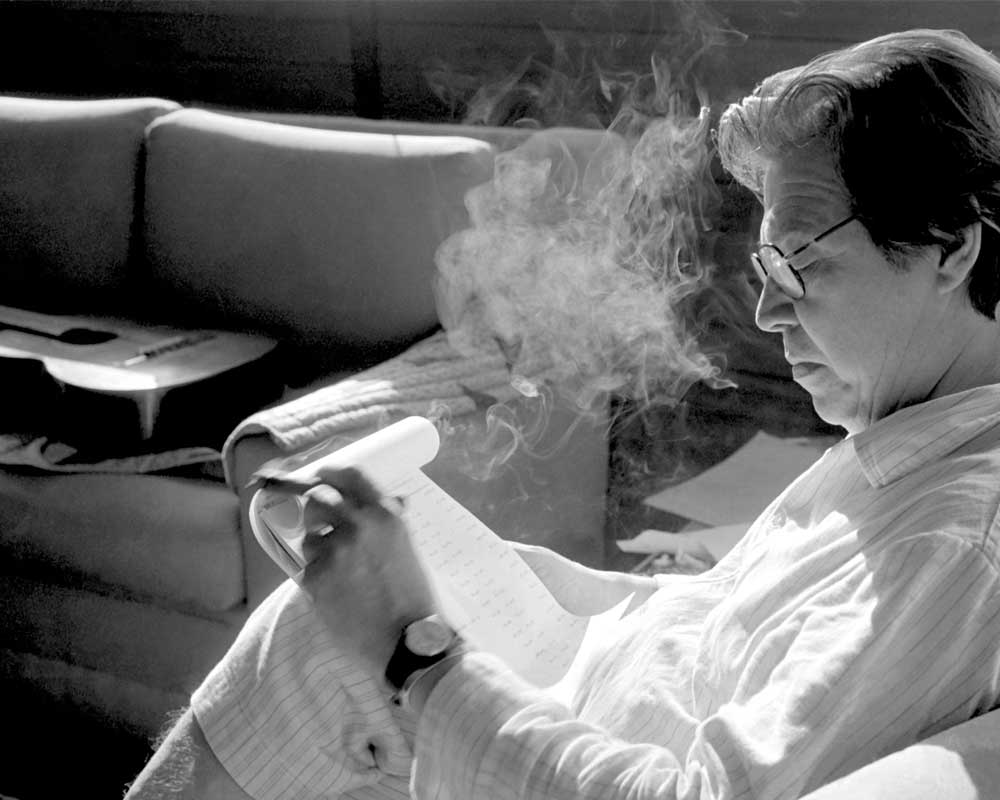Spring can be the most fickle of seasons, especially here in Chicago. Some years, we’ll be basking in endless days of 80 degree weather, or facing wind chills driving the cold into single digits. March? We can only hope…
Down south, the seasons are reversed and spring follows the Brazilian summer as the beginning of the rainy season (only the very southern parts of Brazil ever see snow). Brazilian rains can be both powerful and prolonged, and the red clay washes away easily.
I guess it’s no surprise that spring’s ‘fluid’ nature has found it way into song, and that’s way I like to feature a different version of Antonio Carlos Jobim’s ‘The Waters of March’ in my weekly shows this month.
Today I’d like to tell you the real story about this famous song.
“Águas de Março” is a rare and wonderful rhyme about the cycle of life and as such, the lyrics earned a place in our home as a reminder of the beauty, balance and reality of things (years ago I framed a copy of the lyrics in English and Portuguese). As with other masterpieces, its simplicity is its power; the short line form of the lyrics allow us to focus on the strength of each phrase and the revel in its message.
Inspired by a…
The story goes that Jobim wrote the song during a visit to his family rancho, in the interior of Rio de Janeiro state amid a steady rainstorm which had turned the roads and landscape to mud. He had become frustrated with the difficulties the rain was causing for the construction of a new boundary wall along his property line. The skies rained from above while chaos reigned below, as plainly stated in the lyrics: “It’s the mud, it’s the mud…” With plenty of time to contemplate the situation, Jobim created a modern parable for daily life.
In fact, the original Portuguese lyrics draw from many common observations of a life in the Brazilian interior. Later, Jobim discovered that his story was equally poignant when translated into English. But what about the reversal of seasons? For Brazil, March represents the beginning of autumn, as reflected in his original Portuguese: São as águas de março fechando o verão São promessas de vida no meu coração
Which means: Even while the waters of March bring an end to Summer There is still the promise of life in my heart
Jobim’s English lyrics where only slightly changed to more strongly reflect the sense of rebirth that Spring brings to us in the northern hemisphere.
Both the English and Portuguese lyrics follow on the page, but I’ve left one translation of this song off this page… the one that transformed this song from a Brazilian jewel into a worldwide phenomenon.
In 1985, Coke used the song with rewritten lyrics on a summer “Coke Is It” TV campaign. The ad made its US debut on ABC-TV, January 20th, during the Super Bowl XIX live broadcast. Unique versions in Portuguese for “Coca-Cola é Isso Aí” also aired on Brazilian TV for several years, with lyrics written by Nelson Wellington.
‘Águas de Março’ was already a legendary song in Brazil – due almost exclusively to Jobim’s duet with Elis Regina, who passed away in 1982- but Coke’s worldwide usage of the song insured its popularity.
In 2001, the song was named as the all-time best Brazilian song in a poll of more than 200 Brazilian journalists, musicians and other artists conducted by Brazil’s leading daily newspaper, Folha de São Paulo.
The Waters of March
A stick a stone, it’s the end of the road, it’s the rest of the stump, it’s a little alone it’s a sliver of glass, it is life, it’s the sun, it is night ,it is death, it’s a trap, it’s a gun.
The oak when it blooms, a fox in the brush, the knot in the wood, the song of the thrush. the wood of the wind, a cliff, a fall, a scratch, a lump, it is nothing at all.
It’s the wind blowing free. it’s the end of a slope. it’s a beam, it’s a void, it’s a hunch, it’s a hope. and the riverbank talks of the water of march. it’s the end of the strain, it’s the joy in your heart.
The foot, the ground, the flesh, the bone, the beat of the road, a slingshot stone. a fish, a flash, a silvery glow, a fight, a bet, the range of the bow.
The bed of the well, the end of the line, the dismay in the face, it’s a loss, it’s a find. a spear, a spike, a point, a nail, a drip, a drop, the end of the tale.
A truckload of bricks in the soft morning light, the shot of a gun, in the dead of the night. a mile, a must, a thrust, a bump. it’s a girl, it’s a rhyme, it’s the cold, it’s the mumps.
The plan of the house, the body in bed, the car that got stuck, it’s the mud, it’s the mud. a float, a drift, a flight, a wing, a hawk, a quail, the promise of spring.
And the riverbanks talks of the waters of march. it’s the promise of life, it’s the joy in your heart.
A snake, a stick, it is john, it is joe, it’s a thorn in your hand, and a cut on your toe. a point, a grain, a bee, a bite, a blink, a buzzard, the sudden stroke of night. a pin, a needle, a sting, a pain, a snail, a riddle, a weep, a stain.
A pass in the mountains. a horse, a mule, in the distance the shelves rode three shadows of blue. and the riverbanks talks of the waters of march. it’s the promise of life in your heart, in your heart.
A stick, a stone, the end of the load, the rest of the stump, a lonesome road. a sliver of glass, a life, the sun, a night, a death, the end of the run. and the riverbank talks of the waters of march. it’s the end of all strain it’s the joy in your heart.
Águas de Março
É pau, é pedra, é o fim do caminho. É um resto de toco, é um pouco sozinho. É um caco de vidro, é a vida, é o sol É a noite, é a morte, é o laço é o anzol. É peroba do campo, é o nó da madeira Caingá, candeia, é o Matita Pereira.
É madeira de vento, tombo da ribanceira. É o mistério profundo, é o queira ou não queira. É o vento ventando, é o fim da ladeira É a viga, é o vão, festa da cumieeira. É a chuva chovendo, é conversa ribeira. Das águas de março, é o fim da canseira É o pé, é o chão, é a marcha estradeira Passarinho na mão, pedra de atiradeira.
Uma ave no céu, uma ave no chão. É um regato, é uma fonte, é um pedaço de pão. É o fundo do poço, é o fim do caminho No rosto o desgosto, é um pouco sozinho.
É um estrepe, é um prego, é uma ponta, é um ponto. É um pingo pingando, é uma conta, é um conto. É um peixe, é um gesto, é uma prata brilhando
É a luz da manhã, é o tijolo chegando. É a lenha, é o dia, é o fim da picada. É a garrafa de cana, o estilhaço na estrada. É o projeto da casa, é o corpo na cama. É o carro enguiçado, é a lama, é a lama.
É um passo, é uma ponte, é um sapo, é uma rã. É um resto de mato, na luz da manhã São as águas de março fechando o verão. É a promessa de vida no teu coração.
É uma cobra, é um pau, é João, é José. É um espinho na mão, é um corte no pé. São as águas de março fechando o verão. É a promessa de vida no teu coração. É pau, é pedra, é o fim do caminho. É um resto de toco, é um pouco sozinho. É um passo, é uma ponte, é um sapo, é uma rã. É um belo horizonte, é uma febre terçã.
São as águas de março fechando o verão. É a promessa de vida no teu coração.










